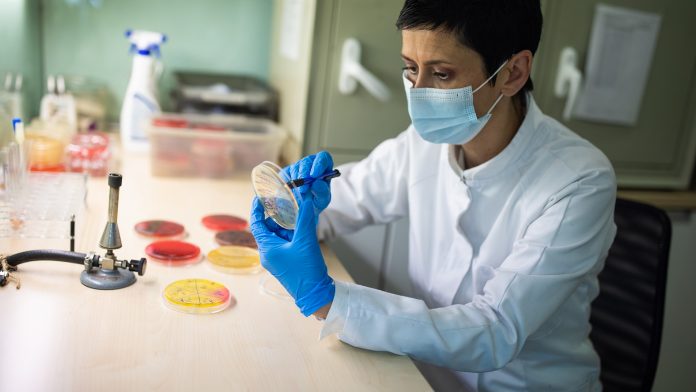
Professor Colin Garner, CEO of charity Antibiotic Research UK, discusses how enhancing knowledge can help to mitigate antibiotic resistance.
Antibiotic resistance is a growing public health concern, threatening the lives of millions of people around the world. Antimicrobial resistance (AMR) occurs when natural bacteria within the body are mutated so that they are no longer killed by antibiotics. Effective antibiotics are crucial, as nearly every medical procedure is dependent on them being effective. Currently, antibiotic resistance claims the lives of 700,000 people per year globally, this is predicted to increase to 10 million by 2050 if the current situation is not improved.
One person who seeks to improve this current situation is Professor Colin Garner, CEO of Antibiotic Research UK (ANTRUK). Through ANTRUK, Garner aims to see a world free from drug-resistant infections through increased research, education, and patient support. With the goal of bringing at least one new antibiotic treatment to market by the early 2020s, ANTRUK is currently raising funds and supporting world-class, peer-reviewed research. Here, Garner tells Health Europa about the necessary steps that ANTRUK is taking in order to raise awareness about AMR and discusses how policies can be implemented to reduce the number of associated deaths.
What are the primary challenges currently facing the management and treatment of drug-resistant infections? Has the COVID-19 pandemic made things more difficult?
Antibiotic resistance is on the rise in the UK, and in many parts of the world. Most people do not realise that antibiotic resistance is increasing, nor are they aware of just how important antibiotics are for the treatment of human diseases.
One of the biggest challenges today is raising awareness of the issues associated with AMR, from an individual perspective, but also a corporate and governmental perspective too. With the onset of the COVID-19 pandemic, arguably, we no longer need to explain to people what a pandemic looks like. Whereas prior to the outbreak, people did not really understand the term or realise that infectious disease resistance, in general, is so easily transmissible across the globe.
I co-authored a couple of reviews about antibiotic use during COVID and what ANTRUK found is that there has been a significant rise in the use of antibiotics, particularly in hospitals, whereas the number of patients with bacterial infections is relatively small, somewhere in the region of 10-15% in contrast to the 70% of patients given antibiotics. As a result, you could expect to see an uptick in resistance in the next 12 to 24 months simply because antibiotics are being used more.
My understanding is that when GP practices were closed, and people complained of feeling ill, antibiotics were quite often prescribed without the patient being seen and without tests being carried out. This was not only in GP practices but other areas of healthcare like dental practices where patients were not seen in person. When the health authorities realised this was happening, they published some guidance about antibiotic use. The challenges are really the unnecessary and overuse of antibiotics and there is a lot we can do in relation to antibiotic stewardship to alleviate this.
Firstly, there is a lack of testing facilities and diagnostics for distinguishing between viral and bacterial infections, which is a knowledge gap that needs to be addressed. In general, COVID has made people more aware of simple things like washing hands which has had an impact. Because of better hygiene there has been less transmission of organisms and hopefully, that will continue.
Another issue is there have been precious few new antibiotics being discovered over the last 30 years. The pharmaceutical industry needs to play a much more significant role than it does, instead of arguing that there is little financial gain. Governments have recognised that and have started to introduce some insurance reimbursement schemes, but I think we are still probably scratching the surface. If you are a pharmaceutical company, and you can either develop an antibiotic or a drug to treat non-communicable diseases (NCDs) like cancer or Alzheimer’s, you are bound to go for the cancer and Alzheimer’s treatments because there is a market and there is going to be widespread use of that drug.
You briefly touched on antibiotic stewardship. To understand this concept more, can you explain how antimicrobial stewardship practices can be introduced to minimise the risk of infection and encourage the appropriate use of antimicrobial treatments?
We are keen to try and do an evidence-based research clinical trial in this area. There have been one or two small feasibility studies such as one in the North East of England co-ordinated by local community pharmacist Mike Maguire, where patients have rung their GP practice with a chesty cough and have been directed to their local community pharmacist. The local community pharmacist has consulted with the patient, and they have done a point of care test using something called a C-reactive protein (CRP) test. This triaging of patients resulted in the majority of those patients not being prescribed antibiotics.

In these antibiotic stewardship studies the patient is triaged between the pharmacist and the general practice and the requirement for antibiotics in that small cohort of patients was dramatically reduced. Approximately 120 patients enrolled, and in the end, only three or four were prescribed antibiotics. This demonstrates that with proper advice and support, patients will not demand antibiotics. They also used postdating prescriptions as another way of avoiding antibiotics being prescribed to them then and there – a sort of ‘wait and see what happens’ type of approach.
We would like to see a similar controlled trial taking place on a much larger scale but need to raise the money to do the trial systematically, rather than a feasibility study, and present the results to the NHS as a way forward. This should not only reduce antibiotic prescribing, but hopefully, it will reduce GPs’ time dealing with patients. From a health economic perspective, this might be a win win for the NHS if it proves that you can reduce the number of prescriptions.
Since the formation of Antibiotic Research UK, how do you feel awareness around drug-resistant infections has changed? How important is it to bring public understanding into conversation about antibiotic resistance?
I think there is a wider public knowledge of resistance since ANTRUK was formed, and we would like to think that we played some role in that growth of awareness. There is now a national five-year AMR strategy and particularly when Dame Sally Davis was Chief Medical Officer, awareness grew as she was very keen on the reduction of antibiotic resistance. Annual monitoring of the level of resistance is taking place and there is a better level of understanding generally. Nevertheless, resistance is increasing, even though antibiotic prescriptions are likely in decline. I do not think we fully understand the reasons for that.
There are various campaigns such as becoming an antibiotic guardian, which tens of thousands of people have signed up to, so there are things going on to raise awareness. ANTRUK also works with companies like Pfizer to produce reports on what individuals can do to reduce antibiotic resistance.
How can public policy be updated to alleviate the burden of antibiotic resistance and reduce the number of associated deaths?
Sadly, the types of campaigns that have been produced up to now take a top-down approach. Whereas what is required is a bottom-up approach. There is quite a lot of evidence that if you discuss these issues as part of the school curriculum, even at primary school level, and tell children about the problem of antibiotic resistance and antibiotics, that tends to stick with them as they get older. They are also very good advocates in persuading their parents not to do something. I think more focus on schools and trying to raise awareness of AMR as part of the core curriculum would be very helpful. Even medical students are not really taught much about this. Education could certainly be improved in this area. In relation to reaching out to the general public, charities such as ours are vehicles to make that happen. I think this is because people respect charities and their role more so than listening to the government campaigns, for example.
Charities should be better supported, and, to that end, we are working to put together an AMR Health Alliance, where we can try and get all bodies that have an interest in AMR to work more closely together, at least from a policy perspective. Something similar to the Alcohol Health Alliance and the Obesity Health Alliance could and should happen with AMR. These are some of the things that we could do to reduce the burden of antibiotic resistance and get people to understand the problem better, because the danger is that if we do not do that, there is the doomsday scenario of 10 million deaths a year. That report was published five or six years ago, and I do not see a great deal of difference since then. Often, what happens in these situations is that there is a lot of talk about the problem but not enough action, that is something that we are trying to change, in our small way.
Antibiotic resistance is a large problem that needs to be tackled by a large number of people. To combat antibiotic resistant infections, people need to be proactive and do what they can on an individual level. ANTRUK is currently the only charity which is fighting the fight against antibiotic resistance, but we are a small charity trying to tackle a large-scale problem.
To join ANTRUK and help them in the fight against antibiotic resistance, you can find more details here: www.antibioticresearch.org.uk/support-us
Professor Colin Garner
CEO
Antibiotic Research UK
www.antibioticresearch.org.uk
https://www.linkedin.com/in/professor-c-garner/
https://twitter.com/cgarner100
This article is from issue 19 of Health Europa Quarterly. Click here to get your free subscription today.
























